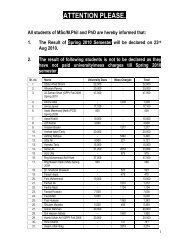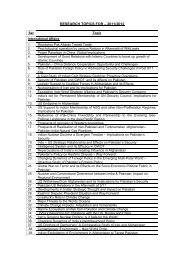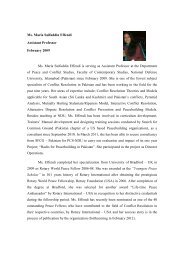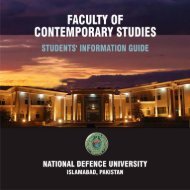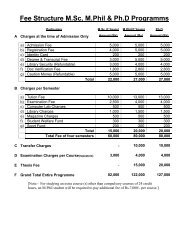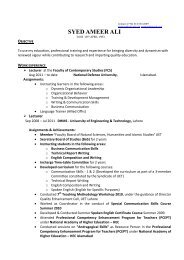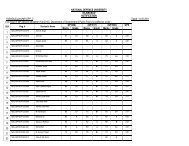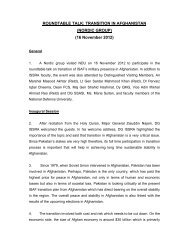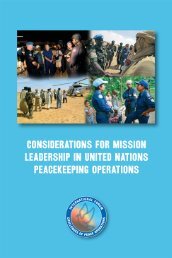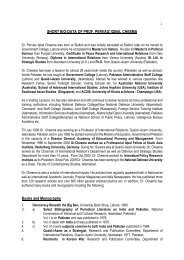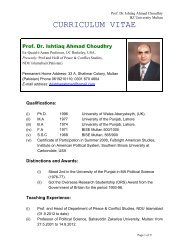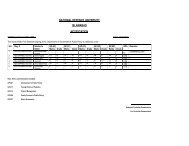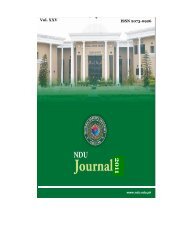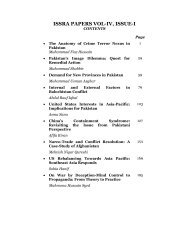OPINION Vol.1, No.1 June 2013 - National Defence University
OPINION Vol.1, No.1 June 2013 - National Defence University
OPINION Vol.1, No.1 June 2013 - National Defence University
Create successful ePaper yourself
Turn your PDF publications into a flip-book with our unique Google optimized e-Paper software.
contemporary dictates compelled other countries to either totally side with the USA or give their silent<br />
willingness on major world issues.<br />
Conclusions from Historical Perspective<br />
Striking conclusions of the post cold war power balance are as under:-<br />
Preamble<br />
The end of the Cold War and the ongoing integration of economies as a consequence of<br />
globalization raise some questions, among others, is the question as to the validity of balance of<br />
power concept in today’s world.<br />
Concept of Balance of Power has also transformed from linear threats to non traditional and non<br />
linear ones. The rise of non state actors is one such phenomenon.<br />
Post cold war era reintroduces the phenomena of colonization with changed face of chaining the<br />
third world through economic, trade and technology transfer policies under the umbrella of IMF,<br />
World Bank, various technological regimes and UN.<br />
Traditional concept of sovereignty of states has transformed.<br />
MYTHS AND REALITIES OF RISING POWERS<br />
Power shifts generate strategic responses by the established powers with a view to ensue<br />
protraction of the already established powers. The present world order is experiencing subtle changes.<br />
With the rise of BRICS, Turkey, South Korea, Australia etc, there is a greater talk of new powers rising<br />
and likely to dominate the world scene in the future. This, however, needs a more critical review. With a<br />
wider perception of US decline as the worlds’ only super power, there is a sense that the 21 st century will<br />
belong to Asia. Notwithstanding, the popular perceptions about US decline, she still dominates the world.<br />
Some pertinent terms are explained below to understand the myths and realities about rising powers.<br />
Definitions<br />
Rising Power. Rising power is a ‘national power’ having certain ingredients to threaten the status<br />
quo of global settings. Pedelford and Lincoln have described it as: “Strength composed of<br />
economic, psychological, moral, military and political elements, successfully directed to the<br />
furtherance of national interests, constitute rising national power”. Rising power operates in<br />
international field in this sense. However, it should be noted that the concept of rising power is<br />
Relative, Conditional and Situational.<br />
Relativity of Rising Power. It is relative in that it has no absolute dimension. Power is rated by<br />
the effect it can bring about. For instance, India is stronger than Brazil but at the same time weaker<br />
than China in terms of economic might.<br />
Conditional. Rising power is conditional in that it depends on variety of factors, the exact role of<br />
which is difficult to assess. States ‘A’ and ‘B’ may have equal resources, military strength etc yet<br />
they may differ in effective power. A strong sentiment of <strong>National</strong>ism, for instance, in State ‘A’<br />
may inspire popular support to government action and policies and may prepare the people for<br />
greater sacrifices. If any such sentiment is totally absent in State ‘B’ and the nation is torn by<br />
intense internal dissentions, this may make it weaker vis-à-vis ‘A’ despite its equal or even<br />
superior resources and military preparedness. India and Brazil are cases in point.<br />
Situational. Rising power is situational in the sense that it depends on specific international<br />
situation. Despite unchanged condition of resources and military might of both, the power equation<br />
between States A and B may change because of changed international situation. Development of<br />
friendly relations between America and India and the formation of an unwritten alliance between<br />
US, India and Israel have affected China and Pakistan equation with her neighbours.<br />
Shift in Global Balance of Power - A Myth or Reality<br />
The question is whether American power is about to see an absolute decline or comparative<br />
decline. Whatever shape it assumes, global shift of power to Asia would invariably accompany new<br />
contours, challenges and opportunities. Without wishing to predict the future, and instead taking the<br />
current situation as a starting point, the international system is characterized by three general tendencies; a<br />
new international order which is both uni and multi-polar at the same time, rise of Asia (China) which will<br />
<strong>OPINION</strong> <strong>Vol.1</strong> <strong>No.1</strong> 44 <strong>June</strong> <strong>2013</strong>



